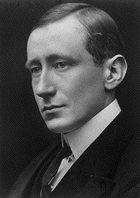 |
| Gugliemo Marconi courtesy of http://nobelprize.org/ |
Guglielmo Marconi is known as the father of wireless technology. Through his experiments and inventions, he changed how the entire world communicated.
He was born at Bologna, Italy, on April 25, 1874, to a noble Italian man and an Irish woman. As a youth, he conducted laboratory experiments at his father's country estate. He was an educated young man, spending time in private studies in Bologna, Florence and Leghorn. Early on, he found his fondness for sciences, both physical and electrical. He took a keen interest in the works of renowned scientists, like Maxwell, Righi and Lodge.
Throughout his many experiments, the young Marconi eventually succeeded in sending wireless signals over more than a mile. But it started out with a nine-meter jaunt in his family's attic.
After reading a book about German scientist Heinrich Hertz, who invented equipment to send and detect electromagnetic waves, Marconi pondered how waves could pass through the air, just as the telephone and telegraph sent messages. In 1895, after many trials, Marconi called his mom up to the attic and showed her a radio-wave sending transmitter he created. Nine meters away was a receiver connected to a bell. When Marconi pressed the transmitter switch, the bell rang across the room because of the electromagnetic waves.
From there, the distances between the two grew, and improved.
At the age of 22, Marconi took this signal-sending apparatus he invented to England and was granted a patent for his wireless telegraphy system—the world's first. Already, the world of communication we know today was taking shape. In July 1897, he formed the Wireless Telegraph & Signal Company Limited and sent wireless signals over a distance of 12 miles. In December 1898, the company opened the world's first wireless factory in Essex.
In December 1901, Marconi proved that wireless waves were not affected by the curvature of the Earth by transmitting a signal across the Atlantic for 2,100 miles for the first time. It was Morse code for the letter "S," sent from the radio station in Poldhu, Cornwall.
Marconi is reported as saying: "It was about half past twelve when I heard three little clicks in the earphones. Several times they sounded but I hardly dared believe."
This experiment was a huge gamble for Marconi—it cost £50,000. But it paid off well beyond anyone's wildest dreams.
Marconi patented lots of new inventions, such as a magnetic detector and a horizontal directional aerial. In 1909, Marconi won the Nobel Prize in Physics, sharing the award with Karl Braun of Germany, in recognition of their contributions to the development of wireless telegraphy.
This is a sample of the presentation speech made at the awards ceremony on Dec. 10, 1909:
" But it was still a great step from laboratory trials in miniature where the electrical waves could be traced over but a small number of metres, to the transmission of signals over great distances. A man was needed who was able to grasp the potentialities of the enterprise and who could overcome all the various difficulties which stood in the way of the practical realization of the idea. The carrying out of this great task was reserved for Guglielmo Marconi." —by the former Rector General of National Antiquities H. Hildebrand, President of the Royal Swedish Academy of Sciences.
World War I waged across Europe, Marconi enlisted in the Italian Army as a lieutenant, later promoted to captain before transferring to the Navy as a commander. In recognition of his service, Marconi was awarded the Italian Military Medal in 1919.
After returning home from the W.W. I, Marconi continued his investigations of short waves, which led to the establishment of a beam system for long-distance communication. The first one of these systems linked England and Canada in 1926.
Marconi was married twice (once to a baron's daughter and once to a countess) and had four children. He died in 1937 in Rome. During his funeral, wireless stations around the world closed down for two minutes as a tribute to their "founding father."
Page created on 10/16/2009 12:00:00 AM
Last edited 2/24/2025 5:45:07 PM
Other Marconi accomplishments include:
• Opening the first microwave radio-telephone link in 1932
• Creating a microwave radio beacon for ship navigation in 1935
• Demonstrated the principles of radar
• Receiving numerous honorary degrees, awards and doctorates
• Installing radio equipment on Queen Victoria's Royal Yacht
